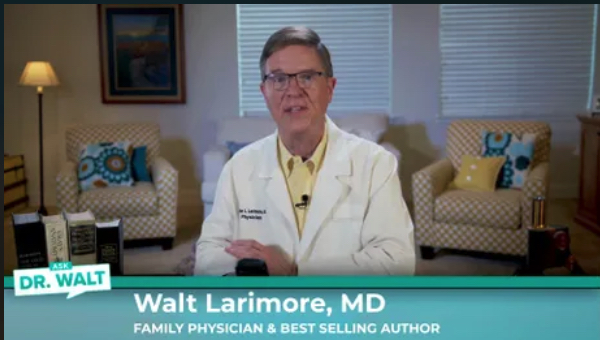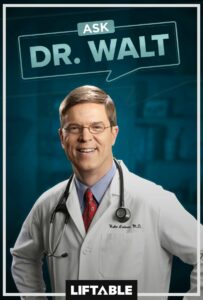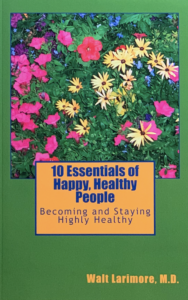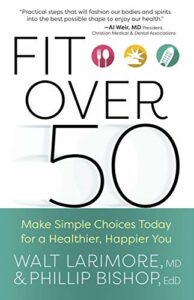
The Writer’s Studio 09 – My Interview with Steve Arterburn (Part 1)
June 9, 2023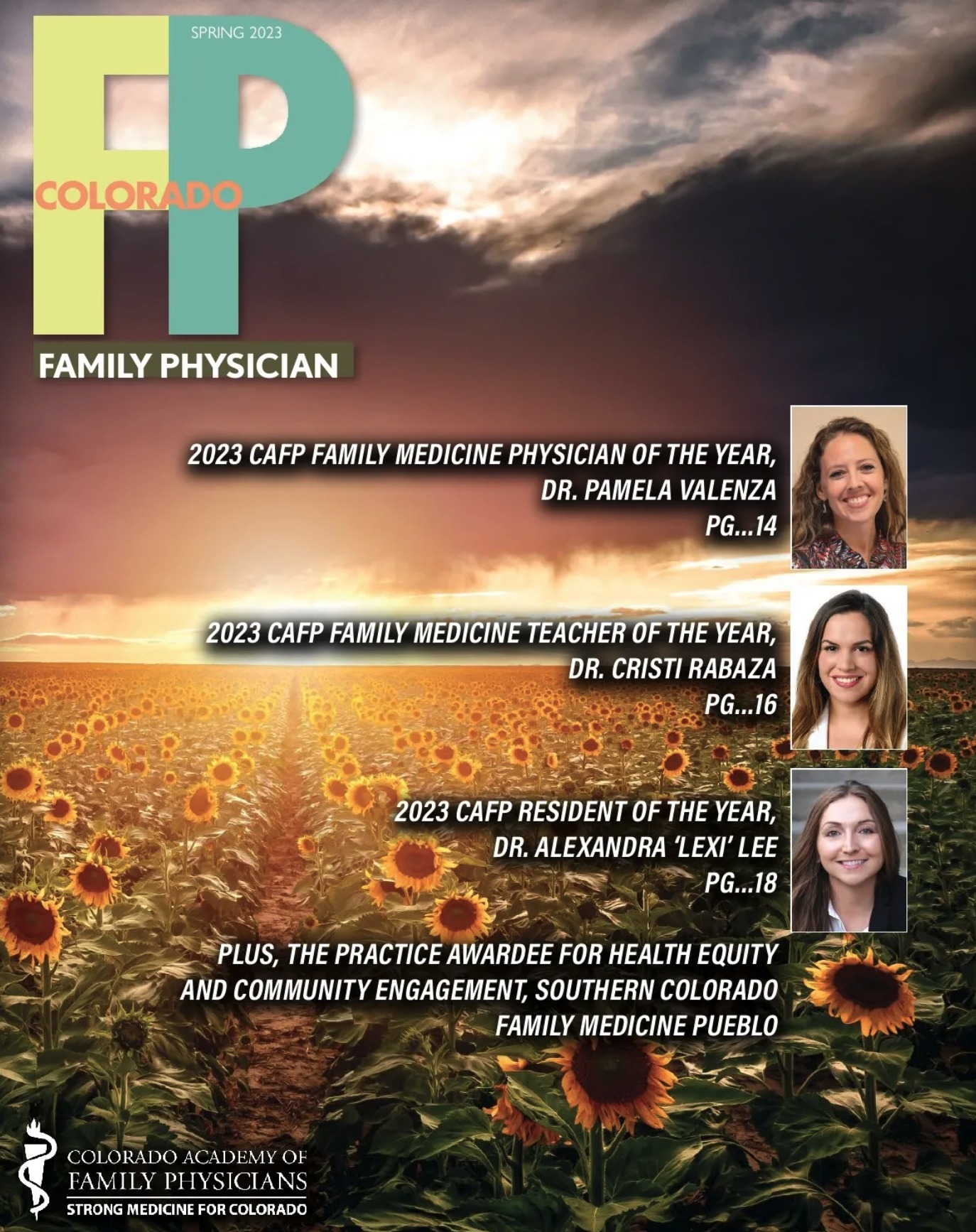
“Vaccine News You Can Use” for Family Physicians – Spring 2023
June 14, 2023Ask Dr. Walt – Episode #07 – Essential #3 – How to Lighten Your Load or The essential of reducing SADness—stress, anxiety, and depression
In this series, I’m explaining the 10 key habits or 10 essentials of happy, healthy people. In this episode, we’ll discuss “How to Lighten Your Load” or “Essential #3 — Reducing SADness—stress, anxiety, and depression.” You can click below to watch a video of the show, or I’ve put the show transcript at the end of the blog if you’d prefer that.
From 2021-2022, I was honored to host a TV show on LiftableTV, “Ask Dr. Walt.” Today, I’m releasing Episode #7, HOW MENTAL HEALTH AFFECTS PHYSICAL HEALTH. I hope you’ll enjoy it.
You probably know that your emotional ups and downs can affect your relationships, right? But did you know that your mental health can also have a direct effect on your physical health—either in a positive or a negative way? I’ll explain in today’s episode of Ask Dr. Walt.
You can learn more about this topic in my best-selling book, 10 Essentials of Happy, Healthy People: Becoming and staying highly healthy or Fit over 50: Make Simple Choices for a Healthier, Happier You.
CLICK HERE FOR 10 E’S CLICK HERE FOR Fo50
Disclaimer: The Ask Dr. Walt show is designed for entertainment purposes to give information on various medical conditions, treatments, and procedures for your personal knowledge and to help you be a more informed consumer of medical and health services.
SHOW TRANSCRIPT
Lighten Your Load
The Essential of Reducing S-A-D-ness
TEASE:
You probably know that your emotional ups and downs can affect your relationships, right? But did you know that your mental health can also have a direct effect on your physical health—either in a positive or a negative way? I’ll explain in today’s episode of Ask Dr. Walt.
OPEN:
Hi, everyone. I’m family physician Dr. Walt Larimore and I’m delighted you are taking the time today to join me in my home office as we continue our discussion about some of the essentials of becoming healthy.
We’ve begun reviewing my top ten recommendations that will put you on a path to becoming healthier physically, emotionally/mentally, relationally, and spiritually. We’ve already covered two of the ten in previous programs. At the end of our last program, I asked you to email me at AskDrWalt@LiftableTV.com and let me know the next one you wanted me to cover. It turns out you voted for what was #4 on the list, the essential of reducing stress, anxiety, and depression, what I called the SADnesses of mental health—so you can lighten your emotional load and improve your mental health. At the end of today’s program, I’ll tell you how you can help me choose the next topic we’ll discuss.
WE HAVE COVERED:
- The essential of true health—physical, emotional, relational, and spiritual
- The essential of self-care—preventive medicine
WE WILL COVER TODAY:
- The essential of reducing SADness—stress, anxiety, and depression
TO BE COVERED IN FUTURE PROGRAMS:
- The essential of forgiveness
- The essential of relationships
- The essential of spiritual well-being
- The essential of a positive self-image
- The essential of discovering your destiny
- The essential of personal responsibility and empowerment
- The essential of teamwork in healthcare
Here are some of your questions about SADness that you sent in and that I’ll answer today:
- Can’t stress be normal?
- It seems that people I know are having more anxiety and depression than ever before. Did the pandemic make things worse than normal?
- I’ve suffered from life-long depression. My pastor says it’s spiritual. A counselor told me it’s psychological. My family doctor says it is chemical or biological. Who the heck is right?
- I’ve had long-term anxiety and depression. Counseling has been recommended. So has medication. Which should I consider?
- How can I determine if my stress, anxiety, and moods are normal without spending an arm and a leg? Are there any internet sites you might recommend?
These are great questions, and I’ll try to answer each of them during our time together.
Stress, anxiety, and depression, under the umbrella of what I have called S-A-D-ness, are everywhere and at one time or another affect us all. The most recent annual measure by Gallup of its Negative Experience Index, which annually tracks people’s experiences, reported that stress, anxiety, and depression—overall unhappiness—is at an unprecedented and all-time high—and made much worse by the pandemic of 2020.
We all can have one or more of these negative emotions to some degree almost every day. But, when one or more of them grow too heavy, they can begin to have surprisingly negative effects—not only on our emotional health but also on our physical, relational, and spiritual health. To lighten your load for the difficult journey of life, we’ll examine each one and show you how to evaluate your level of each.
- Evaluating Stress
Stress is unavoidable in life. In one Gallup survey, about eight in ten Americans say they frequently or sometimes encounter stress in their daily lives. I can’t tell you how many of my patients have told me that they feel as if they are running about as fast as they can on the hamster wheel of life. Nearly all of them report they feel “super stressed.”
For the purposes of this program, I’ll define stress as “any change that requires you to adapt or change the way you are doing something.” Stress can come from big things—retirement, job change, pregnancy, a new grandbaby, moving, the loss of a loved one, attending a new school, or beginning a new job. Stress can also come from little things—a surprise schedule change, a change in the weather, a flat tire or traffic jam, a sudden deadline in your health, misplaced keys, or an electrical outage. These events are stressors. I’ll use the words stress and stressors to mean the same thing.
Some stress is good. Eustress is the term for normal stress which is beneficial or good stress. Distress refers to harmful stress. We are designed to act in response to certain amounts of stress. It can help us grow—physically, emotionally, relationally, and spiritually. In the physical realm, our body is in constant flux.
For example, our bones are constantly being dissolved and new bones are being laid down. With the right amount of stress, our bones become thicker and stronger. We improve our strength and cardiovascular fitness by means of properly apportioned eustress. In the mental and emotional realm, certain amounts of stress keep our minds and emotions healthy. Spiritually, we are constantly being tested—stressed—by our Creator. This “refining” is one path to improved spiritual health. My point is simple: Stress is not only normal—it’s necessary.
However, too much stress or distress at one single time or for too long a time, what’s called “chronic stress” can lead to significant weakness in our overall well-being. Most of us are created with the capacity to handle a certain amount of stress—our stress bucket, so to speak. Some have small buckets and others have larger buckets. No matter what our capacity for coping with stress is, if there’s too much stress and our bucket overflows, stress spills over and can affect our health negatively.
Mayo Clinic experts say, “Stress that’s left unchecked can contribute to many health problems, such as high blood pressure, heart disease, obesity and diabetes. Common effects of stress on your body include headache, muscle tension or pain, chest pain, fatigue, change in sex drive, stomach upset, sleep problems.” Too much stress will not only keep you from becoming a healthier person, but it may also prematurely kill you.
A study published in the journal Heart Rhythm reported: “Increased stress levels associated with today’s hectic lifestyles were linked to an increased likelihood of sudden cardiac arrest any time of day, any day of the week.” The study’s lead investigator, a professor of medicine and medical director of the Heart Rhythm Center at the Smidt Heart Institute at Cedars-Sinai said, “We now live in a fast-paced, ‘always on’ era that causes increased psychosocial stress and … an increase in the likelihood of sudden cardiac arrest.”
So, what about you? Are there too many stressors in your life? You won’t know until you check your stress level. Just as you may not know your car’s oil level is getting low unless you check the dipstick, the same is true for stress, anxiety, and depression. But, by finding this out early, before the problem worsens, it’s easier to prevent a major breakdown. Several free, easy-to-use stress evaluation tools are available:
- NYSUT Stress Assessments— tinyurl.com/yanh78r7
- Holmes and Rahe Stress Scale—tinyurl.com/odoejud
- Mental Health America Stress Test—tinyurl.com/y6wubdrc
If you scored high on one of these screening tools, reducing your daily stress will contribute to becoming healthier. For example, a study by researchers at Duke University Medical Center showed that heart patients dramatically lower their chance of having more cardiac problems by learning and utilizing stress reduction techniques.
Ironically, according to Duke researchers, only about 10 to 20 percent of heart patients ever wind up in these kinds of programs—probably for two reasons: (1) insurance often won’t cover the treatment and (2) it is surprisingly hard to convince patients they have a stress problem, even after suffering a heart attack.
Here are a few ways to reduce stress that I’ve prescribed to patients:
- Take short walks with a friend or a loved one, your spouse or kids, for just 30 minutes per day—and it does not have to be all at one time—can help improve your sleep, boost your mood, and reduce stress. I call it “taking time to kick the leaves.”
- Take emotional health breaks every two or three hours. Think of something you like to do—read, journal, walk, meditate, sing, listen to music, pray, take a stretch break, read and memorize Scripture—and do it, even if only for a few minutes.
- When I was a young husband, I often brought my stress home. A mentor of mine taught me to stop at a park on the way home and take a short walk to “dump my stress in a nearby stream.” This simple technique allowed me to chunk my distress and not carry it home, where it could be noxious.
- Set goals and priorities. Studies consistently show that people with clear goals outperform people with vague aspirations. Decide what God is calling you to do—what must get done and what can wait. I believe you have exactly the right amount of time to do all that God has called you to do. However, you do not have enough time to do God’s calling as well as those things that are not God’s calling for you.
- Learn to say no to new tasks if they are putting you into overload or if God is not clearly calling you to them. A Christian Counselor once told me, “In managing one’s stress level, I would suggest to a client that before adding something to their plate, they take a few minutes to write down how the additional activity would impact their schedule, their family’s other activities, the overall rhythm of the home. And, if they already have children’s sports activities, Bible studies, etc., how those responsibilities would be affected.”
- Note what you have accomplished at the end of the day, not what you have been unable to do. Stay connected with people who can provide emotional and other support. To reduce stress, ask for help from friends, family, and your faith community.
- Spend more time reading. British research showed reading is one of the most effective ways to overcome stress. It took the average person just six minutes to relax once they started turning pages, and it reduced stress levels by 68 percent.
- Consider exploring stress-coping programs in your community If none of these options helps. Seek the advice and assistance of a trusted pastoral professional or a Christian mental health expert. God never promised us a comfortable life (2 Timothy 3:12; 1 Peter 4:12) but he does promise to comfort us in this life (John 16:33; 2 Corinthians 1:2-4).
- Evaluating Anxiety
We all know what it’s like to feel anxious. Do you remember the butterflies in your stomach before a first date or a big presentation, the tension you feel when someone is angry with you, the way your heart pounds when you’re in danger? Anxiety in its most basic form is healthy—a normal response designed by our Creator to arouse us and get us ready for action. Anxiety can prepare you physically and emotionally for a threatening situation. Anxiety causes us to study harder for our exams; it’s what keeps us on our toes when we’re giving a speech or teaching. Anxiety is designed both to help us cope and to assist us in performing at a higher level.
An anxiety disorder is another matter. The disorder occurs when anxiety does the opposite of what it was designed to do. Instead of helping you cope, it prevents you from coping and dramatically disrupts your daily life. Anxiety disorders aren’t just a case of bad nerves. They are illnesses that often have roots in both our biological and biochemical makeup and our past experiences. Not surprisingly, anxiety disorders frequently run in families.
For some who live with this disorder, the anxious feelings may be so uncomfortable that to avoid them they stop some, or most, of their everyday accomplishments. Others self-medicate with alcohol, drugs, or frantic activities. For others, panic attacks can occur so swiftly and strongly that they result in experiences of terror, which can completely immobilize them. Of all the emotional health maladies, anxiety disorders are the most common and pervasive in the US. Nearly forty million Americans experience an anxiety disorder in any given year.
There are several types of anxiety disorders, each with its own distinct features and its own treatment. Many people, especially those of religious conviction, believe people should be able to overcome the symptoms by sheer willpower or by more faithful observance of religious rituals or practices. However, for people with these disorders, this simply is not the case. The good news is that effective new treatments are available.
If you frequently experience anxiety—and even if you aren’t sure whether you do or don’t—there are several free, easy-to-use anxiety evaluation tools that allow you to check your “oil level” when it comes to anxiety:
- Zung Self-Rated Anxiety Scale—tinyurl.com/y9srp2sx
- Hamilton Anxiety Rating Scale—tinyurl.com/ycpvf7mj
- You can find a number of other Anxiety Tests here—tinyurl.com/ydchqfoo.
The purpose of this program is not to discuss these specific anxiety disorders or their treatments in-depth, but rather to convince you that if your emotional wheel is not strong, you can strengthen it. And, if you don’t work to improve it, it’s less likely you’ll become a healthier person.
But I do want to briefly discuss the most common of the anxiety disorders—one called “generalized anxiety disorder” or “GAD.” People with GAD worry at length about health, money, job, family, or work. Simply the thought of getting through the day provokes anxiety. They are unable to relax and often have trouble falling or staying asleep. Their worries are typically accompanied by physical symptoms—especially trembling, twitching, muscle tension, headaches, irritability, sweating, or hot flashes. They may feel light-headed or out of breath. They may feel nauseated or have to go to the bathroom frequently. They may have palpitations or chest pain. Sometimes they feel as though they have a lump in their throat. They tend to feel tired, have trouble concentrating, and sometimes suffer depression.
One of my patients on my first day of practice in the Smoky Mountains of Western North Carolina had classic GAD. “I’ve always been a worrier,” he confided. “I worry about everything! I’m always keyed up, always on the go. Doc, I can’t stop—it’s like I’m unable to relax. At times the spells come and go, and at other times it’s with me all the time. These worrying and fretting spells can go on and on. I worry about things for days at a time—getting more and more nervous and uptight the more I think about it. I just can’t let some things go.”
“On top of that,” he added, “I’m having terrible sleep problems. I get to thinking about things at bedtime—and it’s like my energy gets going. Other times I’ll wake up in the middle of the night, get to thinking about things, and get so wired up I can’t go back to sleep. Sometimes, when I’m having one of these spells, I’ll feel light-headed. Or, worse yet, my heart starts racing or pounding and that scares me to death—and it makes me worry even more.
“Doc, I need you to fix me. Check out my heart—or my thyroid. Something’s going on here—and it ain’t good!”
So, I did check his heart, and I did a thorough screening of a blood sample—only to discover that all of his systems, including his thyroid, were fine. But when I asked him to take an anxiety assessment questionnaire, his scores indicated a severe anxiety disorder.
It took a second medical opinion for him to finally accept the fact that virtually all of his physical symptoms were from GAD. But once he came to accept it and began to take the proper prescription medication for his condition, and received some basic counseling from a nearby psychologist, he showed a dramatic improvement in his emotional health.
I suspected he could do even better if he would undergo some good cognitive-behavioral therapy, which is another highly recommended treatment for GAD. But he didn’t take my advice. Like many with GAD and other mental and emotional
disorders for whom there is a stigma associated with seeing a counselor, he refused to seek counseling. Nevertheless, not only did he do well with the treatment he chose, but so have his three sons, all of whom have GAD.
GAD usually comes on gradually. Most folks find that the symptoms start in childhood or adolescence, but it’s not unusual for it to begin in adulthood or even in the senior years. GAD is more common in women than in men and often occurs in relatives. One clue that a person has this disorder is that he or she will spend at least six months worrying excessively about a number of everyday problems.
If anxiety is negatively affecting you or those around you, consider seeing your family physician, a licensed pastoral professional, or a Christian counselor. Most experts are recommending that anxiety disorders should be treated with psychological therapy, pharmacotherapy, or a combination of both. Most psychologists I talk to believe a particular type of talk therapy called “Cognitive Behavioral Therapy” is the psychotherapy with the highest level of evidence for effectiveness.
After anxiety, depression is the second most common issue that can weaken emotional health and prevent people from staying highly healthy. It often accompanies anxiety disorders, and when it does, it should be treated along with the anxiety. Depression may be accompanied by feelings of sadness, apathy, and hopelessness, as well as by changes in appetite or sleep. Depression can also make it difficult to concentrate.
Let me tell you a story about another one of my patients, She, who was in her late sixties and was the life of the small Presbyterian church in town. If the doors were open, she was there. Her family had built that church. Her love, gifts, and prayers sustained it. But slowly she began drifting away. As the pastor and elders began to notice her absences, one of the elders commented, “You know, even when she’s here—well, she’s not really here. She seems distant.”
Several folks from her church went to her home to visit. She adamantly claimed that she was fine. She just didn’t feel like going out as much, now that she was “getting up in years.” The pastor’s wife insisted that she see her physician for a physical checkup. He reported that she was physically fine. The exam and all the tests were reported to be normal. After that, she seemed to disappear from church. People occasionally saw her at the grocery store, but when she saw them, she’d just turn and go the other way.
I went to see her one day. I didn’t know her, but I knew her neighbor. I hadn’t been in the small town of Bryson City, North Carolina, very long—in fact, I’d only been in practice a few months. The neighbor was concerned. “Something’s wrong with that woman,” she told me. “She always decorates her house and yard for Christmas—but not this year. She always bakes for the whole neighborhood during the holidays—but not this year. But worst of all, she always plants a garden. This year, she hasn’t even tilled!”
When I knocked on her door, she opened it with only a crack. I introduced myself, and she let me in. She tried to be sociable but just wasn’t up to it. I knew what was wrong. Within minutes of entering the house, I felt depressed. Being around a depressed person can make you feel depressed. I asked a few diagnostic questions. She admitted she had trouble going to sleep and staying asleep. Her energy and motivation were gone. Her concentration had vanished. She felt downhearted. She confided that she’d thought about suicide, but then quickly added, “I’d never do that. I love my kids and grandkids too much!”
I explained to her some of the causes of depression and just how easily it could be treated. She promised to make an appointment with me that week. She did. And within just a few days of starting a simple and inexpensive generic antidepressant and seeing a counselor at our practice, her “old” self started to bloom. By the time her corn was knee-high, she was back to her normal self!
According to the National Alliance on Mental Illness, “When a person experiences two or more illnesses at the same time, those illnesses are called comorbid.… In mental health, one of the more common comorbidities is that of depression and anxiety. Some estimates show that 60 percent of those with anxiety will also have symptoms of depression, and the numbers are similar for those with depression also experiencing anxiety.”
Researchers tell us much of what manifests as depression is caused by an imbalance in the hormones of the brain. Researchers tell us 37 percent of adults take medications that actually increase the risk of depression, including hormones, blood pressure medications, and medicines for heartburn. Regardless of the cause, most depression is treatable with a variety of treatments—anti-depression medications, dietary supplements, nutritional therapies, exercise, light therapy, pastoral counseling, or psychotherapy. In fact, up to 80 percent of those treated for depression show an improvement in their symptoms within days to weeks of beginning medication, psychotherapy, attending support groups, or a combination of these treatments. Nevertheless, despite its high treatment success rate, nearly two out of three people suffering from depression do not actively seek nor receive proper treatment.
According to multiple studies, the combination of medication and psychotherapy, even just a few sessions of talk therapy, seems to provide the quickest and most sustained response. Dr. Jerry L. Halverson says, “Several meta-analyses of studies of the combination of psychotherapy and pharmacotherapy for patients with depression have documented an advantage of the combination treatment compared with either treatment alone.” He adds, “Combination therapy has also been associated with significantly higher rates of improvement in depressive symptoms; increased quality of life; and better treatment compliance, especially when treatment is needed for longer than three months.”
Healthcare professionals also treat depression with diet and exercise. Many studies over the last two decades have found exercise is an effective treatment for depression—and some show that aerobic exercise can be as effective as antidepressants in treating mild to moderate depression—and with side effects such as improved health and weight management rather than medication side effects. Other research indicates exercise not only boosts your mood, but also sharpens your memory, alleviates anxiety, helps you sleep better, and increases your creativity. One review of aerobic exercise and major depression recommends that “patients participate in three to five exercise sessions per week, for 30 to 45 minutes per session. Furthermore, the majority of research emphasizes that the exercise regimen should be continued for at least 10 to 16 weeks to achieve the greatest antidepressant effect.”
Even a modest exercise program is an effective, robust treatment for patients with major depression and the benefits are likely to endure, particularly among those who adopt it as a regular, ongoing life activity. Even resistance exercise training such as weightlifting significantly reduces depressive symptoms among adults regardless of health status. Not only does exercise treat depression, but it also may actually prevent it. A 2019 report concluded that “physical activity can reduce the risk of depression…Fifteen minutes of vigorous physical activity or an hour of moderate exercise reduced the risk of depression by 26 percent, and researchers said there also was evidence that a lack of exercise may increase the risk of depression.”
What you eat may be as important as how you move when it comes to depression. A 2018 study found that people who follow a heart healthy diet, the Dietary Approaches to Stop Hypertension (DASH) diet, which emphasizes eating fruits and vegetables along with low-fat or nonfat dairy, lean meats, and avoiding foods high in salt and sugar, also have a lower chance of developing depression. While other studies suggest that people who follow a Mediterranean diet, which emphasizes fruits, vegetables, and fish, and limits meat and dairy products, also have lower rates of depression. Even people with moderate to severe depression improved their mood and signs of depression by eating a more healthful diet.
The bottom line is: The majority of people who suffer from depression can become healthier—even highly healthy. You don’t have to put up with chronic or disabling depression! But first, you need to know if you have it or not. The United States Preventive Services Taskforce and American Academy of Family Physicians recommend screening for depression for all adults older than 18 years, regardless of risk factors, using what is called the Patient Health Questionnaire-2 (PHQ-2) screening instrument:
PHQ-2 Screening Instrument for Depression
| Over the past two weeks, how often have you been bothered by any of the following problems? | Not at all | Several days | More than half the days | Nearly every day |
| Little interest or pleasure in doing things | 0 | 1 | 2 | 3 |
| Feeling down, depressed, or hopeless | 0 | 1 | 2 | 3 |
Scoring: A score of three or more is considered a positive result and means you should then take the PHQ-9 (which you can find at tinyurl.com/y3fbru38) or schedule a visit with your family doctor if you screen positive. These depression self-evaluation tools are designed to help you determine if you should see a licensed pastoral or healthcare professional about your feelings. They are screening tests only and should never replace a thorough evaluation by your family physician, mental health professional, or pastoral professional.
Some Christian psychiatrists say mental health is biochemical and may need help through diet and medication, while psychological health is emotional and may need help through exercise, fresh air, and counseling, whereas spiritual health needs pastoral care and God. In my experience, most folks can benefit from all three.
Finally, if you want to save time, there’s a test that will allow you to test for stress, anxiety, and depression that you can find at tinyurl.com/zr74tjd. This and the other tools we’ve reviewed can help you determine which, if any, S-A-D-nesses you might be wrestling with.
According to Reverend Samuel Rodriguez, president of the National Hispanic Christian Leadership Conference, “Christians struggle with depression and even suicidal thoughts. It does not make you less of a Christian. Just like heart disease or cancer does not dilute our Christianity, neither does mental illness.” Reverend Rodriguez adds, “Suffering from mental illness is not a sin. Yet, not addressing it may very well be.” At the very least, it’s a lost opportunity to improve your health and happiness.
We’ll have more tips for you in each of these areas in future shows, but next time I want to continue our examination of the 10 Essentials of Healthy, Happy People. We have seven more to cover, and I’d love you to vote on which one you want me to talk about next. Just drop me an email at AskDrWalt@LiftableTV.com and let me know your next choice.
WE HAVE COVERED:
- The essential of true health—physical, emotional, relational, and spiritual
- The essential of self-care—preventive medicine
- The essential of reducing SADness (stress, anxiety, and depression)
WHICH WOULD YOU LIKE ME TO DISCUSS NEXT TIME?
- The essential of forgiveness
- The essential of relationships
- The essential of spiritual well-being
- The essential of a positive self-image
- The essential of discovering your destiny
- The essential of personal responsibility and empowerment
- The essential of teamwork in healthcare
Just drop me an email at AskDrWalt@LiftableTV.com and let me know your next choice and other questions you have. What concerns do you have about your or your family’s health? One warning, I cannot answer specific questions about your individual health, but I bet you have plenty of great general questions to ask me, so send them to AskDrWalt@LiftableTV.com, and we’ll get to as many as we can during future programs.
In addition, you can read more about these 10 Essentials in two books that you can find on my website, www.DrWalt.com. One is Fit over 50: Make Simple Choices for a Healthier, Happier You and the other is 10 Essentials of Happy, Healthy People: Becoming and staying highly healthy.
Don’t forget to vote on our next program. Until our next visit, let’s get moving together toward true health, and “Dear friend, I pray that you may enjoy good health and that all may go well with you, even as your soul is getting along well.”
Disclaimer: The “Ask Dr. Walt” show is designed for entertainment purposes to give information on various medical conditions, treatments, and procedures for your personal knowledge and to help you be a more informed consumer of medical and health services.
© Copyright WLL, INC. 2023. This blog provides healthcare tips and advice that you can trust about a wide variety of general health information only and is not intended to be a substitute for professional medical advice, diagnosis, or treatment from your regular physician. If you are concerned about your health, take what you learn from this blog and meet with your personal doctor to discuss your concerns.

